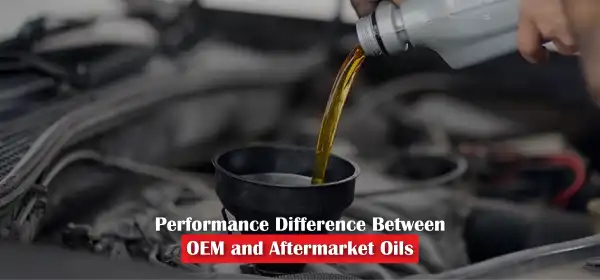When it comes to engine maintenance, engine oil plays a pivotal role in protecting your vehicle’s internal components. Yet, one question often puzzles car owners: What’s the difference between OEM and aftermarket engine oil, and which one is better for your vehicle’s performance?
In this blog, we’ll compare OEM vs aftermarket engine oil, analyze their performance, and help you make an informed decision. We’ll also explore the top OEM engine oil suppliers in Dubai and where you can find reliable aftermarket engine oil suppliers in Dubai.
What is OEM Engine Oil?
OEM stands for Original Equipment Manufacturer. In the context of engine oil, OEM engine oil is the specific type or brand of oil recommended by your vehicle's manufacturer. It meets the precise standards and formulations set by the carmaker to ensure maximum compatibility and performance.
OEM Engine Oil Performance
The performance of OEM engine oil is tailored to meet the needs of a specific engine model. OEM oils are:
- Pre-tested by the manufacturer
- Compliant with vehicle warranty terms
- Engineered to provide optimal lubrication
- Often designed with a specific viscosity, additive blend, and temperature range in mind
Because of this, using OEM oil can help ensure long-term engine reliability and efficiency. It’s also the safer choice for newer vehicles still under warranty.
What is Aftermarket Engine Oil?
Aftermarket engine oil, on the other hand, refers to oils produced by third-party manufacturers that are not officially affiliated with your car’s original maker. These oils are designed to meet or exceed industry standards and often cater to a broader range of engines.
Aftermarket Engine Oil Benefits
Here are some notable benefits of aftermarket engine oil:
- Cost-effectiveness: Aftermarket oils are generally more affordable than OEM-branded oils.
- Variety and customization: You can choose from a wider range of viscosities, additives, and formulations.
- High-performance options: Some premium aftermarket brands offer oils that outperform OEM oils in extreme conditions.
- Availability: Easier to find across local and online suppliers.
Many reputable aftermarket brands are certified by institutions like the API (American Petroleum Institute) and ACEA (European Automobile Manufacturers' Association), ensuring quality and safety.
Difference Between OEM and Aftermarket Oil
Let’s dive deeper into the difference between OEM and aftermarket oil in terms of composition, compatibility, cost, and performance.
|
Feature |
OEM Engine Oil |
Aftermarket Engine Oil |
|
Manufacturer |
Produced or endorsed by vehicle maker |
Made by third-party companies |
|
Compatibility |
Guaranteed fit for specific engines |
May require research for compatibility |
|
Warranty |
Maintains car warranty |
Risk of voiding warranty if not approved |
|
Price |
Generally more expensive |
Usually cheaper |
|
Additive packages |
Engine-specific formulations |
Broad-range or performance-focused options |
|
Availability |
Sometimes limited |
Easily available |
OEM vs Aftermarket Oil for Cars: Which One Should You Choose?
Choosing between OEM vs aftermarket oil for cars depends on several factors:
1. Vehicle Age and Warranty
If your vehicle is under warranty, it’s safer to go with OEM-approved engine oils. This ensures you’re protected in case of engine damage.
2. Driving Conditions
For normal, everyday driving, OEM oil should suffice. However, if you regularly drive in extreme temperatures or heavy traffic, high-performance aftermarket engine oil might be more suitable.
3. Budget
If you’re on a tight budget, aftermarket oil can be a cost-effective alternative. But make sure it meets the same standards as your OEM recommendation.
4. Performance Expectations
Drivers looking for enhanced engine performance, better fuel economy, or longer oil change intervals may benefit from specialized aftermarket engine oil benefits.
Best Engine Oil for Performance
If you’re after the best engine oil for performance, it may not always be the OEM brand. High-end aftermarket oils with synthetic formulations often provide:
- Better thermal stability
- Improved lubrication under high stress
- Extended oil change intervals
- Enhanced fuel economy
Brands like Mobil 1, Castrol EDGE, and Liqui Moly offer high-performance oils that can exceed OEM specifications—especially for sports cars or turbocharged engines.
Where to Buy in Dubai?
Finding high-quality oil in Dubai is easy with the right supplier. Whether you're loyal to OEM brands or prefer aftermarket alternatives, choosing a trusted vendor is crucial.
OEM Engine Oil Suppliers in Dubai
Authorized dealerships and certified auto part retailers like Spareparts.me offer genuine OEM engine oil that ensures your car stays under warranty and operates optimally.
Aftermarket Engine Oil Suppliers In Dubai
If you’re looking for variety and better prices, Spareparts.me also offers a wide range of aftermarket engine oils from reputed brands. These are perfect for customers seeking budget-friendly or performance-enhanced options without compromising quality.
Why Choose Spareparts.me?
Spareparts.me is your one-stop online store for both OEM and aftermarket engine oils in Dubai. Here's why you should consider buying from them:
- Genuine OEM oils for all major car brands
- Certified aftermarket products with global standards
- Competitive prices and seasonal discounts
- Quick delivery and customer support across UAE
- Expert guidance on selecting the right oil for your vehicle
Whether you need oil for a Toyota, BMW, Nissan, or Mitsubishi, Spareparts.me has what you need.
Final Thoughts
Understanding the performance difference between OEM and aftermarket oils is crucial in making the right choice for your vehicle. While OEM engine oil performance is reliable and often necessary for warranty coverage, aftermarket engine oil benefits can't be ignored—especially in terms of cost, performance, and variety.
Still unsure? Visit Spareparts.me, the leading auto parts supplier in Dubai, where you can compare both options, get expert advice, and make a purchase that’s best for your engine’s health and your wallet.



